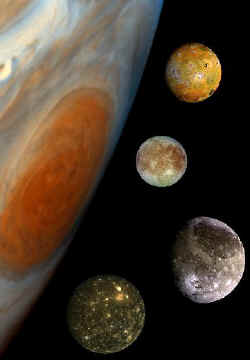[/caption]
The planet with the most moons in the Solar System is Jupiter, with a total of 63 confirmed moons (as of 2009). Of course, it’s always possible that more moons will be discovered orbiting Jupiter in the future, and that number will go up.
Eight of Jupiter’s moons are regular satellites, with 4 large, spherical moons, and 4 smaller moons that orbit closer to Jupiter. Jupiter has an additional 55 tiny irregular satellites.
The planet with the second highest number of moons is Saturn, with 61 moons. With such a close total, more moons could easily be discovered circling the rings planet, and push its total higher.
The next planet with a high number of moons is Uranus, with 27 known moons.
This is followed by Neptune with 13 moons, Mars with 2 moons, and then Earth with its single moon.
Mercury and Venus have no moons. Although Pluto isn’t a planet anymore, it does have a total of 3 moons.
We have written many articles about moons in the Solar System. Here’s an article about the largest moon in the Solar System, and here’s an article about how many moons there are in total in the Solar System.
Here’s an article from NASA about Jupiter’s moons, and here’s Hubblesite’s News Releases about Jupiter.
We have recorded a whole episode of Astronomy Cast just about Jupiter’s moons. Listen to it here.

